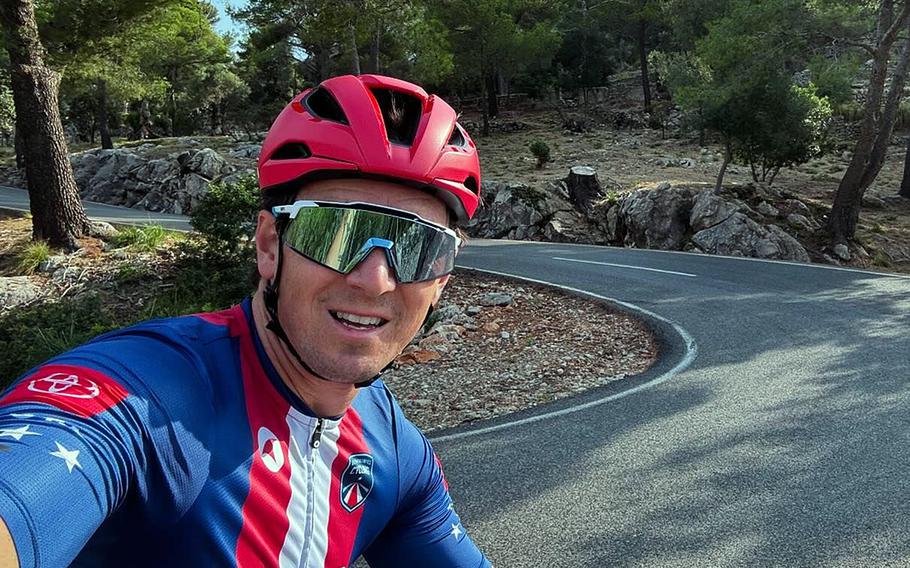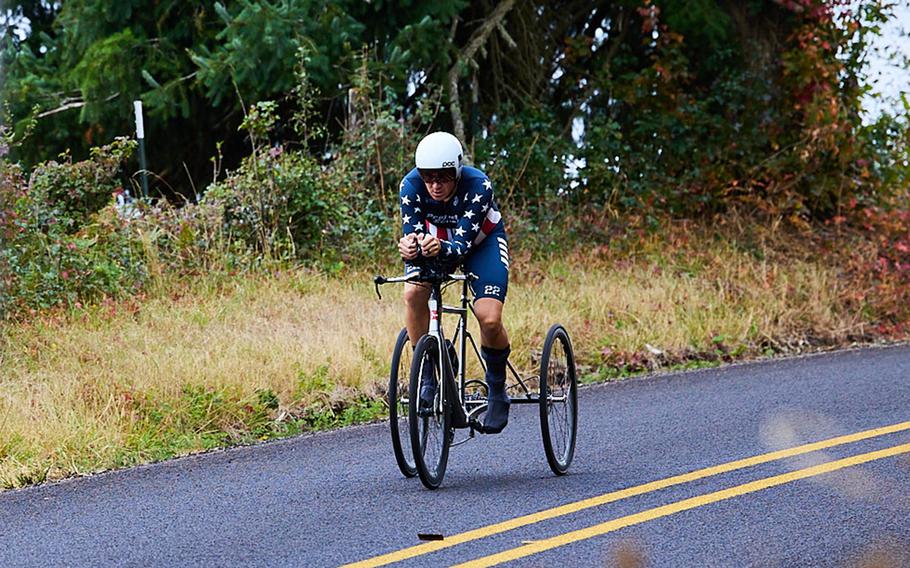
Dennis Connors during training in Mallorca, Spain, in August 2024. A Marine Corps veteran, Connors will be competing in the para cycling men's T2 time trial and road race on Sept. 4 and Sept. 7, 2024, respectively, during the 2024 Paris Paralympics. (Facebook/Dennis Connors Cycling)
Dennis Connors never considered packing it in.
The Marine veteran always has led an active lifestyle: climbing in his youth, snowboarding in his 20s after joining the Corps and cycling for mental health therapy after leaving the service.
Multiple traumatic brain injuries left him with ataxia, affecting his ability to comprehend space and his place in it, but that didn’t stop him. Neither did two strokes that left him partially paralyzed on his left side.
The Livermore, Calif., native and current Beaverton, Ore., resident wasn’t giving up on his extreme hobbies.
“Things got worse, and I adapted. We call it ‘adaptive sports’ for a reason,” Connors said in an interview set up by Xfinity, his sponsor. “Luckily before my (second) stroke, I was just getting into that adaptive world, so I knew it wasn’t an issue.
“I think a lot of people don’t know that they can continue to do the things they love, and that’s been one of my big mantras: Never stop doing the things you love.”
Not only is Connors still doing those things he loves – he’s excelling.
The 39-year-old para cyclist is the world champion in the T2 road race. He also is making his Paralympic debut on Sept. 4 and Sept. 7 in the time trial and road race, respectively, in Paris.
It will mark the third time Connors has represented the United States. He competed on the junior U.S. rock climbing team from 2001-2003 and served in the Marines for nine years.
“It’s just an amazing feeling to continue to represent my country to the world and to have the honor to wear the flag again,” Connors said.
His time in the Marines put him on the path he rides today.
Connors worked in intelligence. He went on three tours to Iraq and received the Defense Meritorious Service medal from U.S. Special Operations Command for his efforts in 2010.

Marine Corps veteran Dennis Connors will be competing in the para cycling men's T2 time trial and road race on Sept. 4 and Sept. 7, 2024, respectively, during the 2024 Paris Paralympics. (Facebook/Dennis Connors Cycling)
Six years after leaving the service, Connors noticed he struggled with his balance, especially as he picked up cycling. Doctors discovered that at some point he had a stroke.
That made him recall all those times he powered through head injuries overseas.
“One being in the Marines and two, being in special operations command and three, sometimes the only intelligence collector in an area, I couldn’t be like, ‘Oh, my head got hit. I got to stop doing my job,’ ” Connors said. “You got to be tough, and that was a part of being tough at the time. But now I know years later, ‘Oh, those were probably not good.’ ”
Thankfully, those conversations in 2018 helped him realize he was experiencing another stroke in 2020 so he could seek medical treatment quickly.
Still, it made his ataxia worse, affecting his motor skills, balance and coordination. He said he’s nowhere near his baseline movement on his left side.
Instead of riding a bicycle, he moved onto a tricycle. He said he had to unlearn how to ride on two wheels and relearn how to spin on three.
The 6-foot veteran has mastered it in a short time. Three years after his second stroke, he earned the right to wear the rainbow stripes that mark the world champion.
Saying the world champion jersey makes him feel “superhuman,” he knows all eyes will be on him in Paris. He even expects cameras to follow him throughout the race, something to which he’s not accustomed.
“It also makes you the marked rider,” Connors said. “If I try to attack, everybody’s going to follow. If someone else attacks, people won’t follow; they’ll stay with me. … I usually drag the train around more than I should because of that reason.”
No matter the pressure, Connors said it can’t compare to what he felt during missions as a Marine.
As for whether he will come home with something to hang on the mantel, Connors said he isn’t focusing too much on that.
“I’m looking for the whole experience of representing my country in the Paralympic Games,” Connors said, “and if I remember that and I relax and I remember to have fun and that it’s just another bike race, then the medals will come.”